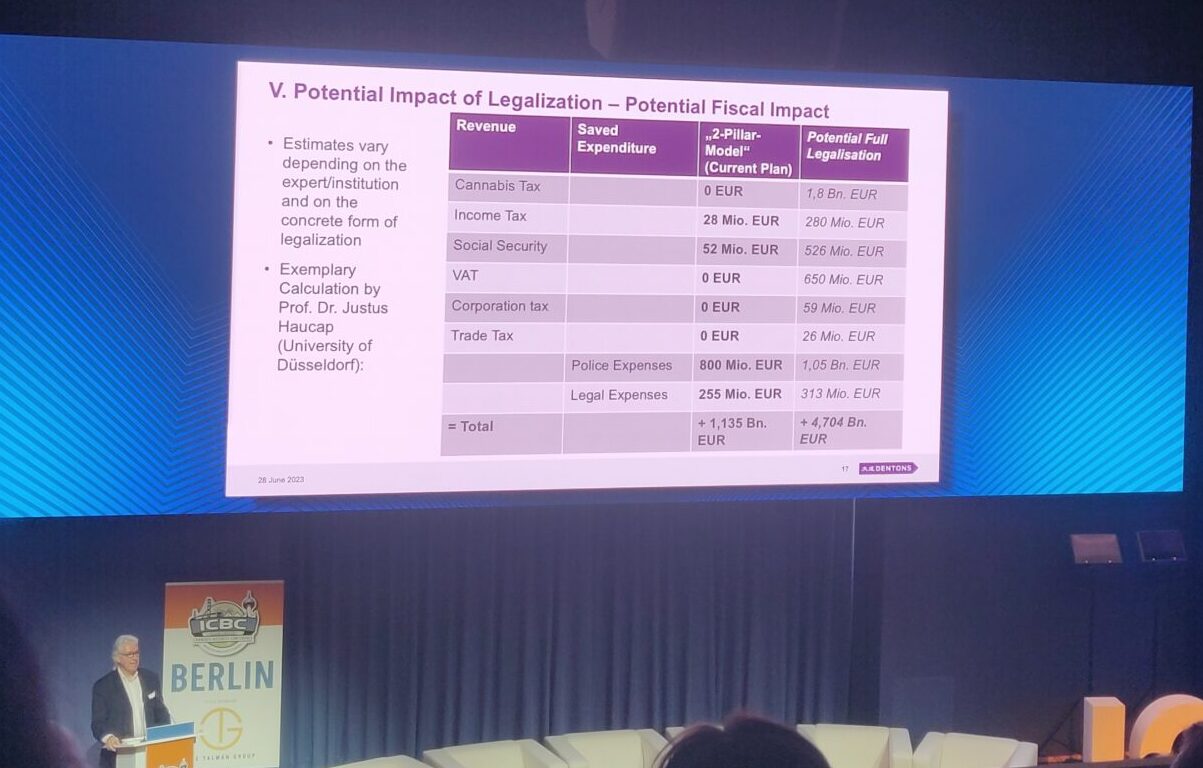The International Cannabis Business Conference (ICBC) Berlin 2023 returned to the Estrel Berlin Hotel last week, welcoming thousands of guests, speakers and exhibitors.
Coming just weeks after the German government announced a major shift in its plans to launch a commercial cannabis market, the conference was abuzz with discussion surrounding what opportunities remained for businesses in the country, and where the next areas of opportunity lay.
This was, understandably, reflected in the conference’s speaker sessions and panel discussions, seeing a number of leading industry voices take to the stage to pick apart the state of play in detail.
Key Takeaways:
- Germany is now pushing ahead with ‘Plan B’, a combination of ‘everything they could find’ that was permissible by EU and UN agreements.
- Many questions remain unanswered regarding both Pillar 1 & Pillar 2
- The 250m school exclusion zone for cultivation and consumption sites would mean ‘almost everywhere in Berlin will be an exclusion zone’, and without ‘road markings’ this would be difficult to enforce.
- Pillar 1 is scheduled to be rolled out this year, but there are suggestions it will more likely be early 2024, the timeline for Pillar 2 remains unclear but there is motivation to get it moving quickly.
- The current plan is likely to bring in annual revenues of €1.135bn Euros, while the previous full legalisation plan was projected to come in at around €4.7bn.
- The most significant upcoming change is the removal of ‘all cannabis related active substances’ from the list of narcotics and transferred to a new Cannabis Act, potentially having a significant impact on the medical market.
- While ‘disappointing’ for businesses, the new legislation still means Germany is ‘spearheading’ European cannabis reform, with no other countries other than Malta (and now Luxembourg) offering such liberal cannabis laws.

The opening session, led by partner at leading business law firm Dentons Peter Homberg, walked the audience through what we know, and what we don’t, about the current proposals put forward by the German government in April.
Mr Homberg explained that the German government went to the European Commission (EC) in October 2022 with its original proposals for an adult-use cannabis market, ‘in an informal process asking the EC, can we do it?’.
This was, he suggests, part of an effort to avoid being reprimanded by the European Court of Justice again, after recently losing ‘big time’ over its data protection policies.
“What happened, nobody says clearly, but I am going to say it clearly. They said no.
“They did not allow what we had envisaged in October…So what has happened? Plan B.
He added that this ‘Plan B’ was created by the German government ‘looking in the box and taking everything they could find’ that was permissible by EU and UN agreements, resulting in a strategy which was ‘disappointing for the industry’.
With the new strategy being leaked to the press in May, Mr Homberg suggested that there remained a number of practical questions that have yet remained unanswered.
The first issue related to Pillar 1 of the new proposals, and the launch of cannabis cultivation clubs across the country, which by Mr Homberg’s calculation could each need to grow 300kg per year per club.
Given that cannabis clubs will need to be a certain distance away from schools, this would make it near impossible to find enough space in cities like Berlin, an issue which was discussed in detail in later panels.
Regarding the second pillar, which proposes Switzerland-style cannabis pilot studies, Mr Homberg said it is not yet clear whether these would need to be supplied by domestic producers, as stipulated in the original proposals. If so, he says there would be a significant shortfall in supply.
On a more positive note, Mr Homberg referred to the upcoming proposed changes to the German Narcotics Act, which will see ‘all cannabis related active substances’ removed from the list of narcotics and transferred to a new Cannabis Act.
This, he went on to say, will have a potentially significant impact on Germany’s medical cannabis market as major barriers for patients and prescribing doctors will be removed.
Regarding when this new strategy is likely to take place, Mr Homberg said the first pillar is due to be implemented before the end of 2023. However, he said ‘so far we have been a little more pessimistic about the timeframe’, suggesting it was more likely to come in early 2024.
The second pillar is expected to be presented after the summer break, another topic which was delved into in detail later that day.

Next, Georg Wurth, head of the German Hemp Association, gave his analysis of the current situation in Germany, in a session entitled ‘Can Germany Get This Done?’.
Addressing the session’s title directly, Mr Wurth said: “Germany will not get it done.. Full legalisation will not happen in my opinion this decade, and that is disappointing.”
Despite this frank assessment, he went on to suggest that there was still cause for celebration, and that even with the new framework Germany will still have one of the most liberal positions on cannabis in Europe.
“No other country allows you to cultivate or possess small amounts of cannabis in Europe, other than Malta.” (News that Luxembourg has also amended its laws had only just broken. )
“Malta is now the spearhead of legalisation in Europe. Germany in the first pillar is planning to catch up with Malta, drawing even with that spear head. Now I’m sure Europe will follow Germany.”
It’s not like Switzerland where there are 300 people per project, this could see whole states benefit from legal cannabis sales, hundreds of thousands of people. This is still really significant.
As to whether each pillar will be passed, he suggested that while the upper house could still halt the whole process, he believed it was compatible with European law otherwise Malta would have ‘been in much greater trouble’.
Regarding the second pillar, he suggested that Germany’s pilot studies would ‘not be like Switzerland where there are 300 people per project’, but that it could see whole states and hundreds of thousands of people benefit from legal cannabis sales.
Furthermore, he said some municipalities were already applying to host these model projects, ‘putting pressure on politicians.’
“The discussion is not simmering, it’s boiling. So there’s good motivation, but we could do with more advocates in government.”
The following panel discussion, ‘Cannabis Policy Reform Efforts in Germany’, delved much deeper into the various issues with the new legislation already touched on in the previous two sessions.
Hosted by The German Cannabis Business Association’s Jürgen Neumeyer, and attended by politicians from a number of German political parties, the often heated discussion began with the German medical market.
Regarding the current chasm between demand and domestic supply in Germany Roman Rogat of the FDP told the audience that the current limits on domestic production should be ‘seriously discussed, as we’re now reliant on imports’, adding that the ‘idea has to be that we can be independent, and should have a commercial process where the best company succeeds regardless of where they’re from.’
Dr. Kirsten Kappert-Gonther of the Greens said she believed smaller companies should also be considered in this process, adding that the current requirements for cultivators in Germany were ‘ridiculous’, needing to take place in bunkers able to withstand attacks by heavy weaponry.
This raised further questions about the first pillar, and the ‘strange dynamic’ between companies needing to grow medical cannabis in a bunker, but clubs being able to grow in a greenhouse.
Mr Rogat added that Germany was now ‘behind other countries’ in terms of regulation, and that the government was ‘lagging behind our promises’ because the legislative process was taking too long.
It was subsequently suggested that during the energy crisis last year due to the Ukraine war, a raft of German policies in the works, including cannabis reform, fell down the list of priorities and have been delayed.
When asked what opportunities there remained for businesses as part of Pillar 2, Dr Kappert-Gonther said: “The question you asked cannot be answered yet, because Pillar 2 has not been defined. In terms of Pillar 2 we don’t know what we’re dealing with, it must be frustrating for you (businesses).
Regarding timescales, Erwin Rüddel of the CDU/CSU suggested that the raft of ‘outstanding questions to this plan’ meant there was unlikely to be any more decisions made in this legislative period.
This was challenged by other members of the panel, who suggested it was vital to ‘grasp the opportunity now’, and do everything possible to get policy ‘set in stone’ in this legislative period.
Business of Cannabis will be publishing more insights from ICBC Berlin in the coming days.






















